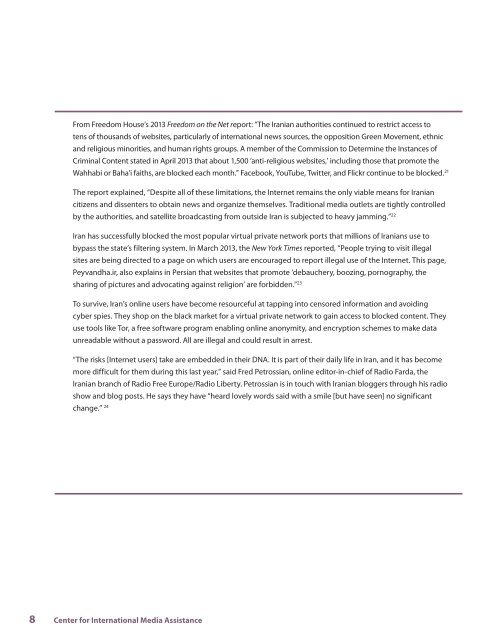CIMA-Iran
CIMA-Iran
CIMA-Iran
- No tags were found...
Create successful ePaper yourself
Turn your PDF publications into a flip-book with our unique Google optimized e-Paper software.
From Freedom House’s 2013 Freedom on the Net report: “The <strong>Iran</strong>ian authorities continued to restrict access totens of thousands of websites, particularly of international news sources, the opposition Green Movement, ethnicand religious minorities, and human rights groups. A member of the Commission to Determine the Instances ofCriminal Content stated in April 2013 that about 1,500 ‘anti-religious websites,’ including those that promote theWahhabi or Baha’i faiths, are blocked each month.” Facebook, YouTube, Twitter, and Flickr continue to be blocked. 21The report explained, “Despite all of these limitations, the Internet remains the only viable means for <strong>Iran</strong>iancitizens and dissenters to obtain news and organize themselves. Traditional media outlets are tightly controlledby the authorities, and satellite broadcasting from outside <strong>Iran</strong> is subjected to heavy jamming.” 22<strong>Iran</strong> has successfully blocked the most popular virtual private network ports that millions of <strong>Iran</strong>ians use tobypass the state’s filtering system. In March 2013, the New York Times reported, “People trying to visit illegalsites are being directed to a page on which users are encouraged to report illegal use of the Internet. This page,Peyvandha.ir, also explains in Persian that websites that promote ‘debauchery, boozing, pornography, thesharing of pictures and advocating against religion’ are forbidden.” 23To survive, <strong>Iran</strong>’s online users have become resourceful at tapping into censored information and avoidingcyber spies. They shop on the black market for a virtual private network to gain access to blocked content. Theyuse tools like Tor, a free software program enabling online anonymity, and encryption schemes to make dataunreadable without a password. All are illegal and could result in arrest.“The risks [Internet users] take are embedded in their DNA. It is part of their daily life in <strong>Iran</strong>, and it has becomemore difficult for them during this last year,” said Fred Petrossian, online editor-in-chief of Radio Farda, the<strong>Iran</strong>ian branch of Radio Free Europe/Radio Liberty. Petrossian is in touch with <strong>Iran</strong>ian bloggers through his radioshow and blog posts. He says they have “heard lovely words said with a smile [but have seen] no significantchange.” 248 Center for International Media Assistance


